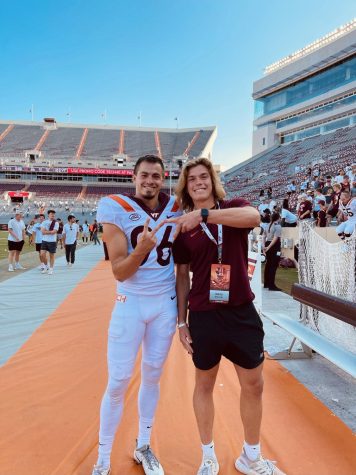College Athletes Able to be Paid Under Revolutionary New Deal
January 4, 2022
Earning a million dollars straight out of high school sounds too good to be true. For D1 athletes that fantasy is now a reality. The NIL deal allows athletes to profit off of their names and promote or represent different companies.
 Before this deal was signed, the NCAA prohibited athletes from profiting off of their names or to receive sponsorship due to preserving an amateur feel. “I know it is [ NIL Deal is] a way for athletes at the college level to make money through endorsements and sponsorships,” junior Caleb Owens said.
Before this deal was signed, the NCAA prohibited athletes from profiting off of their names or to receive sponsorship due to preserving an amateur feel. “I know it is [ NIL Deal is] a way for athletes at the college level to make money through endorsements and sponsorships,” junior Caleb Owens said.
The division a college athlete plays in can determine the amount of money they get just based on their recognition, along with the amount of playing time an athlete gets. “It could be unfair for the star athletes of certain teams as well as you’ll probably not make as much money if you’re in D3 instead of D1,” Owens said.
With money being involved at an earlier age and brand deals being more accessible, high school athletics may be impacted. The brand deals could create more pressure on high school athletes and push a self-centered mindset. “High school athletes should be able to get brand deals as well but they just aren’t as experienced,” senior Dylan Bobbit said.
The deal creates conflict between sports as well. Certain sports get different numbers of views and different deals. Football, the most popular college sport, receives 3-6 million viewers for any of the biggest conference games (ACC, Big10, Big12, SEC, PAC 12). As a result, players could receive more offers from companies. “Some sports get paid more than others and it’d be viewed as unfair because another sport is getting less money,” Bobbit said
Divided opinions on this deal include the topic of ruining the team aspect of sports and making high school sports more about money than fun. “I think that involvement of money at a younger age increases competitiveness and takes away from the enjoyment typically had with youth sports,” senior Logan Chaffin said.
The pressure put on high school athletes increasing due to more opportunities to profit off of playing in college. Although the money is beneficial to the collegiate athletes for the work they put in. “College athletes should be able to get paid because they work too hard to not get rewarded at all,” Chaffin said.
The question about whether the money is actually enough to make a difference is decided by how good or well known the athlete is. Players such as quarterbacks for top college football teams are more well known and will be targeted more for promotion deals. Sam Howell, the quarterback at UNC Chapel Hill, signed a deal with Bojangles. Other players around college football are also signing big deals.“Bryce Young made over a million dollars before he even touched the field for Alabama,” Owens said.
Change was made due to complaints from athletes about the NCAA restricting them too much.The deal overall has benefits and disadvantages but is overall beneficial for sports in general and allows athletes more freedom to set themselves up for success in life. Money made by athletes through sponsorships and representation can go towards needs such as food and medical bills if they get injured.
